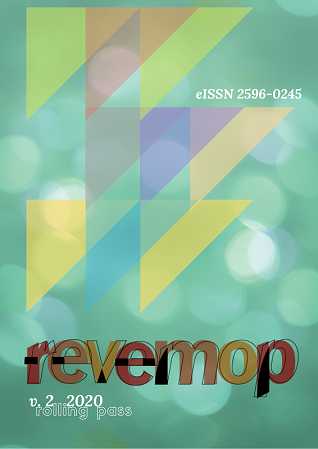Conceptual Maps as study strategy in pandemic times: an experience with students from a public school?
Abstract
The aim of this study was to investigate the perceptions of students about the use of Concept Maps as a study strategy for ENEM, in times of pandemic. The subjects were students of the third year of high school at a public school in Minas Gerais. The theory underlying the study is the Theory of Meaningful Learning and data collection was carried out through student records, Google Forms, whatsapp and in a conversation round the Google Meet platform. The results revealed that, for the students: the Maps serve to structure a summary of the subject; help to memorize the content; contribute to the saving of study time; they have a structure that helps those who have more difficulty in learning the contents and helps to organize the study.
Downloads
References
BRASIL. Ministério da Educação e do Desporto. Secretaria de Educação Média e Tecnológica. Parâmetro Curricular Nacional para o Ensino Médio – Matemática. Brasília: MEC/Semtec, 1999.
CIPRIANO, J. A.; ALMEIDA, L. C. C. S. EDUCAÇÃO EM TEMPOS DE PANDEMIA: Análises e implicações na saúde mental do professor e aluno. VII Congresso Nacional de Educação. Educação como (re)Existência: mudanças, conscientização e conhecimento. Anais. Maceió-AL. 11 p. 2020.
DIAS, É.; PINTO, F. C. F. A Educação e a Covid-19. Ensaio: aval.pol.públ.Educ. Rio de Janeiro, v. 28, n. 108, pág. 545-554, setembro de 2020. Disponível em: <http://www.scielo.br/scielo.php?script=sci_arttex t&pid=S010440362020000300545&lng=en&nrm=iso>. Acesso em: 11 dez. 2020.
DIESEL, A.; BALDEZ, A. L. S.; MARTINS, S. N. Os princípios das metodologias ativas de ensino: uma abordagem teórica. Revista Thema, [S.l.], v. 14, n. 1, p. 268-288, fev. 2017. ISSN 2177-2894. Disponível em: <http://revistathema.ifsul.edu.br/index.php/thema/article/view/404>. Acesso em: 19 mar. 2020. doi:http://dx.doi.org/10.15536/thema.14.2017.268-288.404.
FRANCO, C. et al. Eficacia Escolar en Brasil: Investigando prácticas y politicas escolares moderadoras de desigualdades educacionales. In: CUETO, S. (Ed). Educación y brechas de equidade em America Latina. Chile: PREAL, p. 223-249. 2006.
GRILLO, M. C. et al. A gestão da aula universitária na PUCRS. Porto Alegre: EDIPUCRS, 2008. 170 p. Disponível em:<https://docplayer.com.br/10827148-A-gestao-da-aula-universitaria-na-pucrs.html>. Acesso em: 26 jun. 2020.
JÚNIOR, V. C. A Utilização de Mapas Conceituais como Recurso Didático para a Construção e Inter-Relação de Conceitos. Revista Brasileira de Educação Médica. V. 37, n. 3, P. 441-447, mai. 2013. Disponível em: < https://www.scielo.br/pdf/rbem/v37n3/17.pdf>. Acesso em 25 jun. 2020.
MORAN, J. M. Mudando a educação com metodologias ativas. In: SOUZA, C. A; MORALES, O. E. T. (orgs.) Convergências Midiáticas, Educação e Cidadania: aproximações jovens. Vol. II. PG: Foca Foto-PROEX/UEPG, 2015, p. 15- 33.
MOREIRA, M. A. Mapas Conceituais e Aprendizagem Significativa (Concept maps and meaningful learning). Instituto de Física – UFRGS. 90501-970 Porto Alegre - RS, Brasil. P. 1-2, 1997. Disponível em:https://docs.google.com/viewer?url=https%3A%2F%2Fwww.if.ufrgs.br%2F~morei ra%2Fmapasport.pdf >. Acesso em 24 set. 2020.
NOVAK, J. D. Aprender a criar e utilizar o conhecimento: mapas conceituais como ferramentas de facilitação nas escolas e empresas. Lisboa: Plátano, 2000.
NOVAK, J. D.; CAÑAS, A. J. A Teoria Subjacente aos Mapas Conceituais e como elaborá-los e usá-los. Práxis Educativa, Ponta Grossa, v.5, n.1, p. 9-29, jan.-jun. 2010. Disponível em: <https://docs.google.c om/viewer?url=https%3A%2F%2Fdialnet.unirioja.es%2Fdescarga%2Farticulo%2F3251296.pdf>. Acesso em: 24 set. 2020.
ONTORIA P. A.; GOMEZ, J. P.; MOLINA R. A. Potencializar a capacidade de aprender e pensar: o que mudar para aprender e como aprender para mudar. Tradução Fluvio Lulsisco. S. Paulo: Madras, 2004.
PIMENTEL, F. Metodologias Ativas. Educação Online, 2010. Disponível em:. Acesso em: 14 dez. 2020.
PRANDI, L. R. et al. As mazelas da Educação Pública no Brasil: do atraso à instrumentalização política do ensino. Educere - Revista da Educação, v. 15, n. 2, p. 203 217, jul./dez. 2015. Disponível em:<https://revistas.unipar.br/index.php/educere/article/view/5620/3201>. Acesso em: 11 dez. 2020.






























